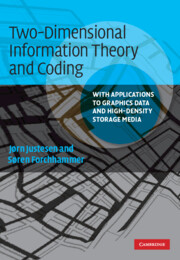 Two-Dimensional Information Theory and Coding
Two-Dimensional Information Theory and Coding Published online by Cambridge University Press: 05 June 2012
Introduction
Typical data sources have complex structure, or we say that they exhibit memory. In this chapter we study some of the basic tools for describing sources with memory, and we extend the concept of entropy from the memoryless case discussed in Chapter 1.
Initially we describe the sources in terms of vectors or patterns that occur. Since the number of messages possible under a set of constraints is often much smaller than the total number of symbol combinations, the amount of information is significantly reduced. This point of view is reflected in the notion of combinatorial entropy. In addition to the structural constraints the sources can be characterized by probability distributions, and the probabilistic definition of entropy is extended to sources with memory.
We are particularly interested in models of two-dimensional (2-D) data, and some of the methods commonly used for one-dimensional (1-D) sources can be generalized to this case. However, the analysis of 2-D fields is in general much more complex. Information theory is relevant for understanding the possibilities and limitations of many aspects of 2-D media, but many problems are either intractable or even not computable.
Finite-state sources
The source memory is described by distinguishing several states that summarize the influence of the past. We consider only the cases in which a finite number of states is sufficient.
To save this book to your Kindle, first ensure [email protected] is added to your Approved Personal Document E-mail List under your Personal Document Settings on the Manage Your Content and Devices page of your Amazon account. Then enter the ‘name’ part of your Kindle email address below. Find out more about saving to your Kindle.
Note you can select to save to either the @free.kindle.com or @kindle.com variations. ‘@free.kindle.com’ emails are free but can only be saved to your device when it is connected to wi-fi. ‘@kindle.com’ emails can be delivered even when you are not connected to wi-fi, but note that service fees apply.
Find out more about the Kindle Personal Document Service.
To save content items to your account, please confirm that you agree to abide by our usage policies. If this is the first time you use this feature, you will be asked to authorise Cambridge Core to connect with your account. Find out more about saving content to Dropbox.
To save content items to your account, please confirm that you agree to abide by our usage policies. If this is the first time you use this feature, you will be asked to authorise Cambridge Core to connect with your account. Find out more about saving content to Google Drive.